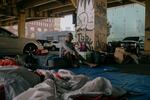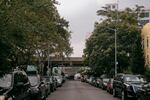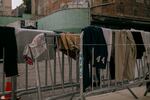
Jose Alvarado, an asylum-seeker who arrived in New York City from Venezuela, sits at his camp. Alvarado says he was expelled from the Clinton Hill shelter due to an incident in the facility bathrooms. Brooklyn, New York, on July 19, 2023.
José A. Alvarado Jr. / José A. Alvarado Jr. for NPR
From the outside, the tall white building looks like any other hip, new Brooklyn living space. But about a thousand migrant men sleep here every night and there's room for hundreds more. It's a sort of mega shelter, poised to become one of New York City's largest.
It's been open for just a few weeks, and it's already riddled with accusations of abuse.
For months, Mayor Eric Adams has been issuing warnings that the New York City shelter system simply cannot handle the deluge of over 90,000 people it has received in the last year or so. "We have no more room in the city," he cautioned at a recent press conference. "We need help from the federal government."
The Adams administration is challenging New York's right to shelter law in court: That's the law that for decades has assured that the city provide a safe haven to anyone in need, regardless of immigration status.
Adams also recently announced several unusual measures including distribution of fliers to asylum-seekers at the border in order to discourage migrants from coming to New York City. Single adults will only be able to stay in shelters for 60 days before having to reapply.
Activists say it's in keeping with this policy shift that the new shelter site — located in Brooklyn's posh Clinton Hill neighborhood — is being referred to as an "emergency respite center," rather than a shelter. It's been touted as a temporary humanitarian aid solution.

Asylum-seekers spill out onto Hall Street outside the Clinton Hill Shelter. Two shower units stand outside at 47 Hall St. in Brooklyn on July 19.
José A. Alvarado Jr. / José A. Alvarado Jr. for NPR

Elcoutoub, 21, an asylum-seeker from Mauritania, has has spent 20 days at the Clinton Hall shelter. He stands outside Washington Hall Park as he seeks relief from the congested confinements of 47 Hall St.
José A. Alvarado Jr. / José A. Alvarado Jr. for NPR
NPR spent several days speaking to asylum-seekers who say conditions in the building are dire. Many described zones of 80 to 90 people sharing two bathrooms. A 26-year-old man named Deivy says he's fleeing armed conflict in Colombia and that he's been living in the shelter for over a week.
He asked that his last name be withheld for fear of retaliation. Deivy says fighting over use of the bathroom facilities is common and showering is an odyssey. Parked outside, two trailers with showers serve the entire building.
"It's bad in there," says one Mauritanian man named Neimar, who also asked that his last name be withheld for fear he'd be in trouble with shelter authorities. Sitting listlessly on a nearby park bench, Neimar describes the experience as a sort of limbo. "We had no life where we came from, but here we have no luck here. No clothing. No food. Nothing."
Lack of access to food is one of the most common complaints. On a recent day shelter occupants say lunch consists of a bag of chips and a water. Often the food has gone bad.
What troubles many people here the most is the security guards. "They treat us like animals," says Neimar. "As if we were not people."
In interviews with more than two dozen people, nearly everyone recounted experiencing physical harassment and verbal slights at the shelter. "I understand enough English to know I'm being insulted," says Deivy.
NPR reached out to the New York City government multiple times for comment on these accusations without response.

Asylum-seekers who arrived in New York City under the expressway that has provided them shelter.
José A. Alvarado Jr./NPR
Advocates say shelters like this one are disheartening, especially given that New York has long been seen as a beacon for immigrants. "For at least 40 years, New York City has provided a right to shelter to all people — regardless of their immigration status — who need a place to stay for the night," says Columbia University Professor Elora Mukherjee, who studies immigration and law. She called the shift in policy "devastating."
For many migrants and asylum-seekers, this Brooklyn location is not the first encounter with the New York shelter system. But it does feel like the last straw. Several described the situation at this new site so dire, they would rather sleep under a nearby highway overpass. Others have no choice but to join a homeless camp of nearly 20 men.

As traffic flows on the Brooklyn Queens Expressway overhead, asylum-seekers who arrived in New York City from Venezuela find shelter within tents under the expressway after being expelled from the Clinton Hill shelter due to an incident in the facility bathrooms.
José A. Alvarado Jr. / José A. Alvarado Jr. for NPR

Clothing — washed inside the Brooklyn facility's two shower units — hangs to dry.
José A. Alvarado Jr. / José A. Alvarado Jr. for NPR
Among them is Jose Antonio. He says he left Venezuela to escape government harassment. "Eighty people using two bathrooms?" he says. "It's a health hazard." When he arrived at the shelter a few weeks ago, it was under construction, still lacking lights. After an altercation over bathroom access in the morning, he says, he was asked to leave. He now he sleeps outside. During the day, he works odd landscaping gigs.
The motto down here: stay working. But the question of work and who is allowed to do it is where the federal immigration bureaucracy labyrinth gets even more complicated. The soonest an asylum-seeker can get a work permit is six months after they apply for asylum. That's a process that can in turn take years.
"The Mayor does make a good point when he says that the city needs help. And that help should take various forms," said Professor Elora Mukherjee. The city, she says, needs the federal government to lend their authority. "First and foremost: the federal government should authorize asylum-seekers to receive their lawful work organization as soon as they enter the United States and fill out the relevant paperwork." There's no indication that this will happen anytime soon. Instead, many men rent scooters in order to work for food delivery apps. By noon on a recent day, the dinging sound of orders start echoing under the bridge. The men head out.

At least 20 asylum-seekers from Venezuela find shelter within tents.
José A. Alvarado Jr. / José A. Alvarado Jr. for NPR

Unable to obtain legal employment, some residents work as delivery drivers in Brooklyn.
José A. Alvarado Jr. / José A. Alvarado Jr. for NPR
It’s a dystopian scene: asylum-seekers, staying in a shelter and under a bridge, delivering pricey meals throughout New York. A few days later, the police sweep the camp. For several hours the men say they are driven around the city on a bus and taken to two different shelters where they are turned away. Eventually, the bus drops them off in Brooklyn again. The men walk back to the highway overpass and to the camp where they find many of their belongings are now missing. One man reports his immigration papers, cellphone, and clothing all gone.
Copyright 2023 NPR. To see more, visit https://www.npr.org.

NYPD officers briefly stop by the campsite to notify residents that they will be returning in the coming days with members of a nonprofit that intends to help find them adequate shelter.
José A. Alvarado Jr. / José A. Alvarado Jr. for NPR